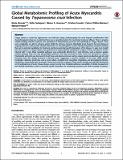Por favor, use este identificador para citar o enlazar a este item:
http://hdl.handle.net/10261/124626COMPARTIR / EXPORTAR:
 SHARE SHARE
 CORE
BASE CORE
BASE
|
|
| Visualizar otros formatos: MARC | Dublin Core | RDF | ORE | MODS | METS | DIDL | DATACITE | |

| Campo DC | Valor | Lengua/Idioma |
|---|---|---|
| dc.contributor.author | Gironès, Núria | - |
| dc.contributor.author | Carbajosa, Sofía | - |
| dc.contributor.author | Guerrero, Néstor A. | - |
| dc.contributor.author | Poveda, Cristina | - |
| dc.contributor.author | Chillón-Marinas, Carlos | - |
| dc.contributor.author | Fresno, Manuel | - |
| dc.date.accessioned | 2015-11-06T12:27:08Z | - |
| dc.date.available | 2015-11-06T12:27:08Z | - |
| dc.date.issued | 2014-11-20 | - |
| dc.identifier | doi: 10.1371/journal.pntd.0003337 | - |
| dc.identifier | issn: 1935-2735 | - |
| dc.identifier.citation | PLoS Neglected Tropical Diseases 8 (2014) | - |
| dc.identifier.uri | http://hdl.handle.net/10261/124626 | - |
| dc.description.abstract | © 2014 Gironès et al. Chagas disease is caused by Trypanosoma cruzi infection, being cardiomyopathy the more frequent manifestation. New chemotherapeutic drugs are needed but there are no good biomarkers for monitoring treatment efficacy. There is growing evidence linking immune response and metabolism in inflammatory processes and specifically in Chagas disease. Thus, some metabolites are able to enhance and/or inhibit the immune response. Metabolite levels found in the host during an ongoing infection could provide valuable information on the pathogenesis and/or identify deregulated metabolic pathway that can be potential candidates for treatment and being potential specific biomarkers of the disease. To gain more insight into those aspects in Chagas disease, we performed an unprecedented metabolomic analysis in heart and plasma of mice infected with T. cruzi. Many metabolic pathways were profoundly affected by T. cruzi infection, such as glucose uptake, sorbitol pathway, fatty acid and phospholipid synthesis that were increased in heart tissue but decreased in plasma. Tricarboxylic acid cycle was decreased in heart tissue and plasma whereas reactive oxygen species production and uric acid formation were also deeply increased in infected hearts suggesting a stressful condition in the heart. While specific metabolites allantoin, kynurenine and p-cresol sulfate, resulting from nucleotide, tryptophan and phenylalanine/tyrosine metabolism, respectively, were increased in heart tissue and also in plasma. These results provide new valuable information on the pathogenesis of acute Chagas disease, unravel several new metabolic pathways susceptible of clinical management and identify metabolites useful as potential specific biomarkers for monitoring treatment and clinical severity in patients. | - |
| dc.description.sponsorship | This work was supported by ‘‘Ministerio de Ciencia e Innovación’’ (SAF2010-17833); ‘‘Fondo de Investigaciones Sanitarias’’ (PS09/00538 and PI12/00289); ‘‘Red de Investigación de Centros de Enfermedades Tropicales’’ (RICET RD12/0018/0004); European Union (HEALTH-FE-2008-22303, ChagasEpiNet);‘‘Universidad Autónoma de Madrid’’ and ‘‘Comunidad de Madrid’’ (CC08-UAM/SAL-4440/08); AECID Cooperation with Argentine (A/025417/09 and A/031735/10), Comunidad de Madrid (S-2010/BMD-2332) and ‘‘Fundación Ramón Areces’ | - |
| dc.publisher | Public Library of Science | - |
| dc.relation.isversionof | Publisher's version | - |
| dc.rights | openAccess | - |
| dc.title | Global Metabolomic Profiling of Acute Myocarditis Caused by Trypanosoma cruzi Infection | - |
| dc.type | artículo | - |
| dc.identifier.doi | 10.1371/journal.pntd.0003337 | - |
| dc.date.updated | 2015-11-06T12:27:08Z | - |
| dc.description.version | Peer Reviewed | - |
| dc.language.rfc3066 | eng | - |
| dc.contributor.funder | Ministerio de Ciencia e Innovación (España) | - |
| dc.contributor.funder | Fundación Ramón Areces | - |
| dc.contributor.funder | Ministerio de Asuntos Exteriores y Cooperación (España) | - |
| dc.contributor.funder | European Commission | - |
| dc.contributor.funder | Universidad Autónoma de Madrid | - |
| dc.contributor.funder | Comunidad de Madrid | - |
| dc.relation.csic | Sí | - |
| dc.identifier.funder | http://dx.doi.org/10.13039/501100004837 | es_ES |
| dc.identifier.funder | http://dx.doi.org/10.13039/100008054 | es_ES |
| dc.identifier.funder | http://dx.doi.org/10.13039/501100000780 | es_ES |
| dc.identifier.funder | http://dx.doi.org/10.13039/501100004593 | es_ES |
| dc.identifier.funder | http://dx.doi.org/10.13039/100012818 | es_ES |
| dc.identifier.funder | http://dx.doi.org/10.13039/501100003767 | es_ES |
| dc.identifier.pmid | 25412247 | - |
| dc.type.coar | http://purl.org/coar/resource_type/c_6501 | es_ES |
| item.fulltext | With Fulltext | - |
| item.grantfulltext | open | - |
| item.cerifentitytype | Publications | - |
| item.openairetype | artículo | - |
| item.openairecristype | http://purl.org/coar/resource_type/c_18cf | - |
| Aparece en las colecciones: | (CBM) Artículos | |
Ficheros en este ítem:
| Fichero | Descripción | Tamaño | Formato | |
|---|---|---|---|---|
| FresnoM_GlobalMetabolicProfiling.pdf | 955,7 kB | Adobe PDF |  Visualizar/Abrir |
CORE Recommender
PubMed Central
Citations
38
checked on 24-abr-2024
SCOPUSTM
Citations
48
checked on 21-abr-2024
WEB OF SCIENCETM
Citations
44
checked on 23-feb-2024
Page view(s)
249
checked on 23-abr-2024
Download(s)
229
checked on 23-abr-2024
Google ScholarTM
Check
Altmetric
Altmetric
Artículos relacionados:
NOTA: Los ítems de Digital.CSIC están protegidos por copyright, con todos los derechos reservados, a menos que se indique lo contrario.
